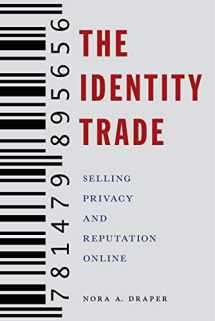
The Identity Trade: Selling Privacy and Reputation Online (Critical Cultural Communication, 7)
Book details
Summary
Description
Review
"Featuring interviews with such industry figures as Fred Davis, founder of the identity management company Lumeria, and Josh Galper, general counsel for the online data vault provider Personal, the book brings to light the cultural and economic ramifications of the publics desire for online privacy. . . . Throughout, Draper examines the rights, expectations, and economics of digital privacy with expert fascination." ― Publishers Weekly
"How did 'protect your privacy online' become 'cultivate your personal brand'? Draper shines a light on the entrepreneurs in the privacy game, many overlooked or long gone, who had an outsized influence on how we think about privacy today. The Identity Trade provides a rich and important history, but also an astute meditation on how industry can shape cultural logics in profound ways." -- Tarleton Gillespie,author of Custodians of the Internet
"In analyzing the burgeoning consumer privacy industry through its failures, Draper traces shifts in the industrial definition of privacy from anonymity to controlled exposure. The Identity Trade demonstrates how the economics of privacy directly shapes our understanding of what privacy is and how we might practice it. Essential reading for anyone concerned about their 'privacy,' their vulnerability to data breaches, and the myriad other 'identity' pitfalls that come along with online life as we know it." -- Alison Hearn,University of Western Ontario
"While we have been obsession over the ways Facebook and Google have blown away our ability to manage information about ourselves, a fascinating and troubling industry devoted to privacy management has emerged. In this lucid book, Draper reveals the assumptions and ideologies that drive the players in that industry, and thus reveals what's really at stake as we lurch toward a future we can't seem to control." -- Siva Vaidhyanathan, author of Antisocial Media: How Facebook Disconnects Us and Undermines Democracy
The successes and failures of an industry that claims to protect and promote our online identities
What does privacy mean in the digital era? As technology increasingly blurs the boundary between public and private, questions about who controls our data become harder and harder to answer. Our every web view, click, and online purchase can be sold to anyone to store and use as they wish. At the same time, our online reputation has become an important part of our identity―a form of cultural currency.
The Identity Trade examines the relationship between online visibility and privacy, and the politics of identity and self-presentation in the digital age. In doing so, Nora Draper looks at the revealing two-decade history of efforts by the consumer privacy industry to give individuals control over their digital image through the sale of privacy protection and reputation management as a service.
Through in-depth interviews with industry experts, as well as analysis of media coverage, promotional materials, and government policies, Draper examines how companies have turned the protection and promotion of digital information into a business. Along the way, she also provides insight into how these companies have responded to and shaped the ways we think about image and reputation in the digital age.
Tracking the successes and failures of companies claiming to control our digital ephemera, Draper takes us inside an industry that has commodified strategies of information control. This book is a discerning overview of the debate around who controls our data, who buys and sells it, and the consequences of treating privacy as a consumer good.


We would LOVE it if you could help us and other readers by reviewing the book
Book review



